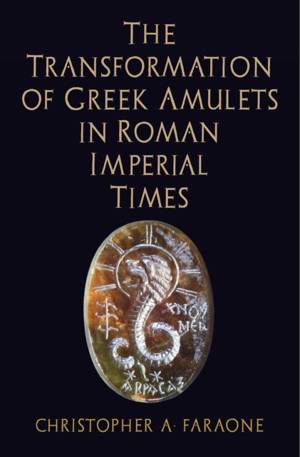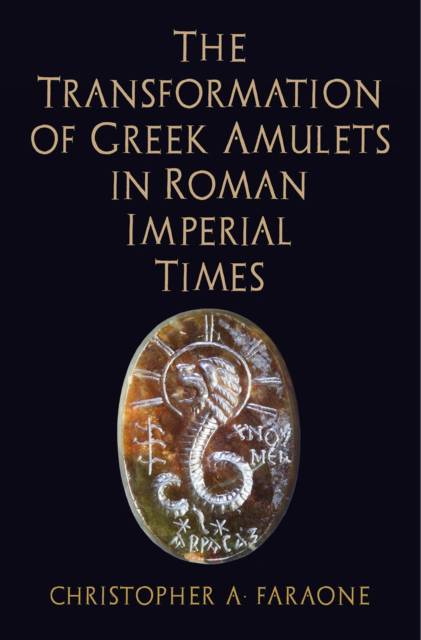
Nos liseuses Vivlio rencontrent actuellement des problèmes de synchronisation. Nous faisons tout notre possible pour résoudre ce problème le plus rapidement possible. Toutes nos excuses pour la gêne occasionnée !
- Retrait gratuit dans votre magasin Club
- 7.000.000 titres dans notre catalogue
- Payer en toute sécurité
- Toujours un magasin près de chez vous
Nos liseuses Vivlio rencontrent actuellement des problèmes de synchronisation. Nous faisons tout notre possible pour résoudre ce problème le plus rapidement possible. Toutes nos excuses pour la gêne occasionnée !
- Retrait gratuit dans votre magasin Club
- 7.000.0000 titres dans notre catalogue
- Payer en toute sécurité
- Toujours un magasin près de chez vous
The Transformation of Greek Amulets in Roman Imperial Times
Christopher A Faraone
127,45 €
+ 254 points
Description
The era of the Roman Empire was distinguished by an explosion of images and texts in a variety of media--metal, papyrus, mosaic, gemstone--all designed to protect, heal, or grant some abstract benefit to the persons who wore them on their bodies or placed them in their homes. In the past scholars have explained this proliferation of readily identifiable amulets by a sudden need for magic or by a precipitous rise in superstition or anxiety in this period, connected, perhaps, with the internal breakdown of Greek rationalism or the migration of superstitious peoples from the East.
Christopher A. Faraone argues, instead, that these amulets were not invented in this period as a result of an alteration in the Roman worldview or a tidal wave of "oriental" influence, but rather that they only become visible to us in the archaeological record as a result of a number of technical innovations and transformations: the increased epigraphic habit of the Imperial period, the miniaturization of traditional domestic amulets, like the triple-faced Hecate, on durable gems, or the utilization of newly crafted Egyptianizing iconography. In short, it is only when explicitly protective or curative texts, or strange new images, are added to traditional Greek amulets, that modern observers realize that these objects were thought to have the power to protect or heal all along. The real question addressed by the book, then, is not why we can identify so many amulets in the Roman Imperial period but, rather, why we have failed to identify them in artifacts of the preceding centuries. Featuring more than 120 illustrations, The Transformation of Greek Amulets in Roman Imperial Times is not only a tremendous resource for those working in the fields of ancient magic and religion but also an essential reference for those interested in the religion, culture, and history of the ancient Mediterranean.Spécifications
Parties prenantes
- Auteur(s) :
- Editeur:
Contenu
- Nombre de pages :
- 512
- Langue:
- Anglais
- Collection :
Caractéristiques
- EAN:
- 9780812249354
- Date de parution :
- 20-04-18
- Format:
- Livre relié
- Format numérique:
- Genaaid
- Dimensions :
- 188 mm x 259 mm
- Poids :
- 1247 g







